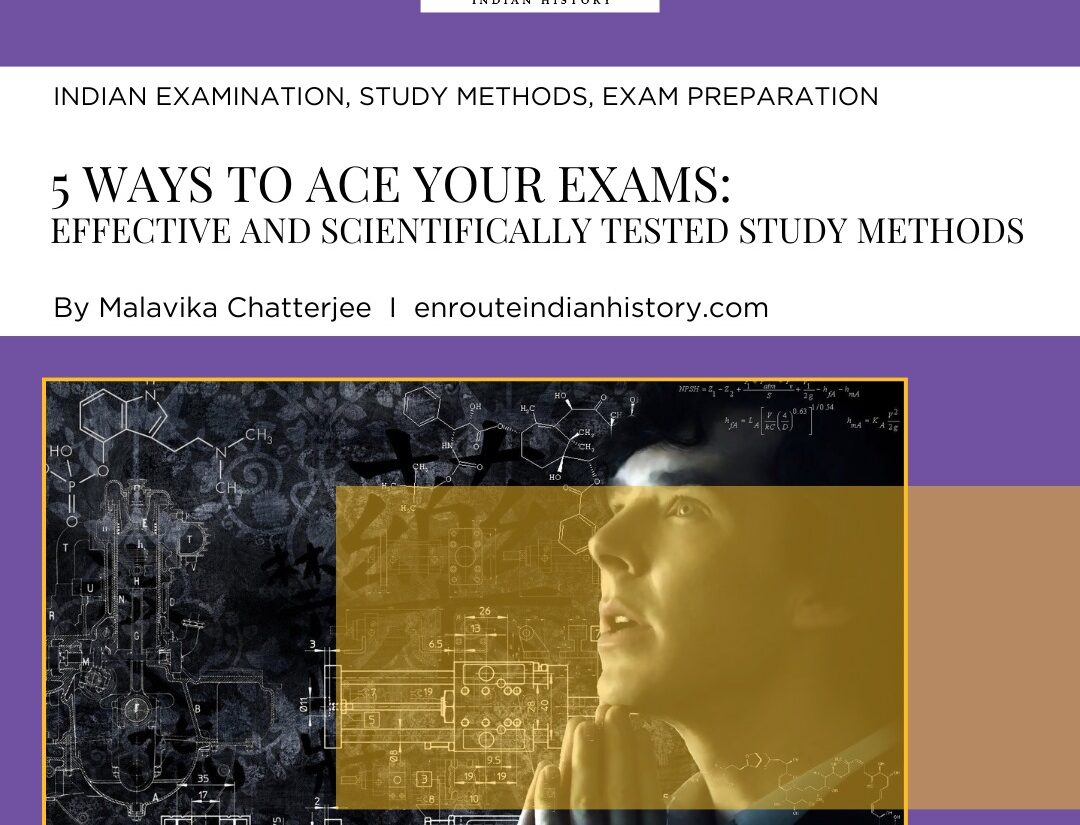5 Ways to Ace Your Exams Effective and Scientifically Tested Study Methods
- EIH User
- February 22, 2024

It has been a decade since I last sat for a traditional examination. Now, having to face one in the coming months, I am eager to use a different approach for the exam. Instead of those usual feelings of trepidation and anxiety, I want to be confident in my ability and knowledge. So, the first thing I did was log on to YouTube. I prefer visual aids over the written word for better retention of information. I searched for How to Study for Exams on Google, and the first hit was How to Study for Exams – An Evidence-Based Masterclass by Ali Abdaal.

Mind Palace, Sherlock BBC Series
Source: https://i.pinimg.com/originals/f5/a8/4c/f5a84c53089f69e98b5a2fcc91acec31.jpg
Here is where my deep dive into effective study preparation methods began. I learned that while most of these methods are intuitive, logical, and contextual, we tend to revert to the tried and tested methods (more popular) of rereading, highlighting, summarising or note-taking. According to Dunlowsky et al. 2013, these methods are assumed to be more effective or expected to be more effective. However, scientifically, they have relatively low utility. Ali Abdaal broadly divides his series on effective study methods into three logical categories: Understanding, Remembering and Focus. The basic principle is that without an in-depth knowledge of your subject, your retention of it is limited. Most of us have resorted to the last-minute preparation to regurgitate it for an examination and have it exiled from our memory. I have always hoped that when I write an exam, I want to channel Sherlock Holmes by creating my own Mind Palace. The hope is that by employing the following methods or strategies, I will not only succeed in the exam but also be able to handle the stress that comes with exam preparation.
Scoping your Subject

Mind Map
Source: https://www.mural.co/blog/mind-mapping
I was curious to know what scientifically tested methods could aid my exam preparation. Ali Abdaal, in his videos, talks about scoping the subject or, in other words, developing an understanding of the syllabus. Conceptually, this provides an overview of the curriculum and a tentative framework to apply all these methods. Google Sheets is pitched as an ideal resource to map out the syllabus within which each spreadsheet represents a sub-topic. Mind Maps or Spider Diagrams could help as a visual guide to scope your subject. These diagrams are better suited when you need a broad understanding of a subject.
Cornell Note-Taking Method

Cornell Note-Taking System
Sources: https://alumni.cornell.edu/cornellians/cornell-notes/
https://learningessentials.auckland.ac.nz/key-study-skills/note-taking/cornell/
It was unsurprising to learn that traditional note-taking or summarising is less effective than other study methods. The argument is that not everyone can make good-quality notes. According to Dunlosky et al. 2013, not only is this method low utility, one needs to learn how to take good notes. However, I am comfortable making notes and using Post-its. Research says that handwritten notes require higher thinking capacity when compared to those made on a laptop and have higher retention capabilities. Also, taking notes after class in the form of questions can help consolidate your understanding of the subject. A highly recommended method to take notes is the Cornell Note-taking System by Prof. Walter Pauk of Cornell University. I call this note-taking 2.0. It combines active note-taking and a higher cognitive effort by forming questions and maximising retention by summarising each page.
Feynman Technique
Named after Nobel Laureate and Theoretical Physicist Richard Feynman, this method helps simplify the most complicated concepts into something easily conveyed to a layperson. The key denominator in the effectiveness of this method is how well you can explain it to anyone, which, in turn, will help you go over the concept and recognise the gaps in your understanding. You will then erase those gaps with a focused study and repeat the process of explaining again. Similar to this method would be the Protégé Effect by Chase et al. 2009 which combines learning and accountability. Their study showed that when one assumes the role of a teacher, one learns more while teaching a concept.
Active Recall
One of the most common study methods proposed by productivity and education experts is Active recall or Active retrieval. It is a method of practice testing which has proven to be the most effective revision strategy. Although this is not a groundbreaking revelation, as most of us use this approach, the big difference is its application and how it massively differs from passive rereading. According to Dunlosky et al. 2013, practice testing or active recall has a high utility factor. Other studies have shown a 15-30% increase in performance (Spritzer, 1939; Butler, 2010; Karpickle and Blunt, 2011). What appealed to me more was how it could help me manage my time rather than waste precious hours rereading a subject. Overall, this method helps to understand concepts and inferences along with verbatim questions.
There are different ways one can apply this method, a popular one being Flashcards, which are a big hit among Medical students. However, they should be for hard-to-memorise concepts and facts that can be tagged Easy, Medium or Hard, based on the difficulty in remembering. These then pop up accordingly whenever you go through the deck. Abdaal uses the Anki App, although any flashcard app will work. Abdaal also suggests an alternative to flashcards with Google Sheets. Column A will have all the questions about your subject, with its answers in Column B. He switches the colour of the text in Column B to white so that the answers are not visible. He also colour codes the rows, i.e. each question based on how easy or difficult it was to recall and can go back to them accordingly. Another traditional but effective study method is that of using Mnemonics. The key is to make the Mnemonics fun or cheeky to be able to remember a list of attributes.
Map your Retention
Spaced Repetition is a popular study method of increasing memory retention that actively reduces your Forgetting Curve. The Forgetting Curve or the Ebbinghaus Forgetting Curve represents the loss of information over time. Spaced retention can interrupt this natural process of forgetting by spreading out your revision over time. It is an intuitive method of figuring out the intervals between each session, which will gradually increase to the point where the curve does not apply. The higher the cognitive effort required to retrieve information, the stronger the coding for that information in your memory. According to Karpickle et al. 2011, the spaced retrieval method shows a staggering improvement even within a session or day.
Abdaal mentions the Retrospective Revision Timetable, based on a similar concept. It considers your retention of the subject matter and helps create an appropriate timetable. Similarly, Interleaving also improves retention. This concept has been applied to sports like hockey, as mentioned by Abdaal. Essentially, this approach frequently switches gears between topics, which you would then recall. He also talks about a more organic approach where you tie curiosity or experience to learning and remembering things instead of seeking information.
Boost Productivity and Focus

Productivity Apps available online
Source: https://blog.curiosity.ai/why-productivity-tools-can-harm-your-productivity-and-what-to-do-about-it-bc62193c6dfd
Often, we struggle to do the things we do not want to. Studying for exams is high up there on that list for me. Instead of waiting for motivation to strike, I should make studying for exams more pleasurable. Abdaal feels that “motivation is a myth” and “is an infantile fantasy”. He suggests different ways to approach this lack of motivation by creating a better environment around the thing you do not like doing, weighing the benefits of it, or assessing the cost of not doing the thing. Whichever method works, instead of waiting for the elusive motivation to knock on your door, Abdaal encourages you to “Hack your motivation equation” by reducing distractions and the following methods.
The Trident Method
In my opinion, Abdaal has mastered Time Management and succeeded in prioritising what matters most. He functions on calendars, which might not be everyone’s cup of tea, but it works, especially during exams. He swears by the Trident Calendar Method, which helps you use time intentionally and effectively. I was intrigued to know more about this system based on the ancient Sumerian calendar and developed by Robert Carlsson (https://clusterado.com/2023/06/13/the-trident-calendar-a-comprehensive-guide-to-understanding-its-benefits-and-drawbacks/). What appealed to Abdaal about this method was visualising the year (or week or day) at a glance. The keyword for this method to be effective is ‘Ideal’. You need to ask yourself what your ideal day or week would look like. Blocking chunks of time for yourself, your family or whatever you want to prioritise can help you plan your day around those. Guess what is Abdaal’s favourite calendar app? You guessed it! Google Sheets. However, any calendar app will work, with Notion and Google Calendar being more popular.
The Pomodoro Technique:
Created by Francesco Cirillo, The Pomodoro Technique helps you take systematic breaks if you find it hard to focus for long periods. You can set a time you feel comfortable studying for, followed by a short break. Repeat this cycle four more times and reward yourself with a long break.
Music
Over time, I have found it extremely difficult to study with music that has lyrics. So, I like listening to instrumental music that helps me focus. Abdaal also recommends instrumental music. However, he points out that working or studying in an environment similar to the one for your exams will increase your performance. A wide variety of music playlists catered to studying exist online, like the LoFi Girl on YouTube and generic music-for-studying playlists on apps like Spotify.
Masterclasses
These days, there are plenty of resources or guidance online with platforms like Skillshare, Coursera, and YouTube, to name a few. Students have always benefitted from visual aids from sites like these that also have the bonus of a like-minded community. Moreover, online study marathons and videos titled ‘Study With Me’ provide a company for those who seek it for their exam preparation.
My research into effective study methods has increased my confidence and changed my approach towards exams. Irrespective of the results, these strategies will likely inculcate a positive attitude towards exam preparation and make learning pleasurable. I will not resort to making and re-making revision timetables as I often fail to stick to a pre-determined routine. Like Abdaal, I would treat revision as fluid, without the compulsion of doing certain topics on certain days. Even though rereading and note-taking make us feel more productive, I recognise how I need to be efficient with my time. For now, I shall leave the highlighting to Bullet Journalling and explore my creativity through mind maps.
References:
Chase, C.C., Chin, D.B., Oppezzo, M.A. and Schwartz, D.L., 2009. Teachable agents and the protégé effect: Increasing the effort towards learning. Journal of Science Education and Technology, 18, pp.334-352.
Dunlosky, J., Rawson, K. A., Marsh, E. J., Nathan, M. J., & Willingham, D. T. (2013). Improving Students’ Learning With Effective Learning Techniques. Psychological Science in the Public Interest. https://doi.org/10.1177/1529100612453266
Karpicke, J. D., & Blunt, J. R. (2011). Retrieval Practice Produces More Learning than Elaborative Studying with Concept Mapping. Science. https://doi.org/1199327
https://www.colorado.edu/artssciences-advising/resource-library/life-skills/the-feynman-technique-in-academic-coaching
The Trident Calendar: A Comprehensive Guide to Understanding Its Benefits and Drawbacks
- May 15, 2024
- 6 Min Read























